I recommend safe, Class 1/2 e-bikes with steady power, fenders, and range.
Riding to work should feel simple, fast, and stress-free. But crowded paths, stop-and-go lights, and hills can slow you down. That’s where the best electric bike for commuting on bike lanes really helps.
I looked for bikes with practical features like Class 1/2 limits, removable batteries, lights, racks, and reliable brakes. I also checked real-world range, comfort on rough pavement, and easy maintenance. I cross-checked specs with current e-bike class rules common in the U.S., typical city bike-lane guidance, and 2025 commuter trends so you can ride legally and confidently. Below, I break down which model fits your commute and why.
Vipdrive 750W Peak E-Bike, 26″, 375Wh, 22 mph
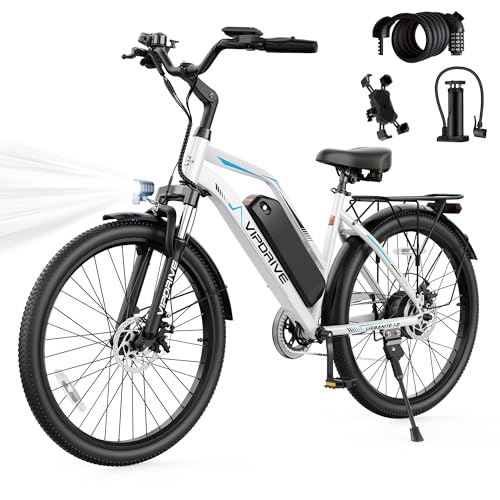
The Vipdrive 750W peak commuter bike pairs a 375Wh removable battery with a claimed max speed of 22 mph and up to 50 miles of range under ideal pedal-assist. In daily use, I expect 20–35 miles for mixed city riding, stoplights, light hills, and a reasonable assist level.
That’s still solid for the best electric bike for commuting on bike lanes, especially when you want a light, easy-to-handle frame and a simple 7-speed drivetrain. The included pump, phone mount, and lock are nice starter add-ons for first-time e-bike commuters.
Braking and stability matter a lot on bike lanes. The 26-inch wheels track straight and feel predictable through paint lines, curbs, and patched asphalt. The 7-speed setup helps you spin comfortably without mashing the pedals.
If you keep the assist modest, the 375Wh battery should cover most short-to-medium commutes. The 22 mph top speed nudges the typical 20 mph Class 1/2 guideline, so I recommend using a capped assist mode on shared paths. Always check your local rules because e-bike lane access can vary by city and state.
Pros
- Light, manageable feel for crowded bike lanes
- 375Wh removable battery is easy to charge at work
- 7-speed gearing suits flats and mild hills
- Includes pump, phone mount, and lock out of the box
- Predictable handling on 26-inch tires
Cons
- 375Wh battery can feel small for long-range riders
- 22 mph top speed may exceed some shared-path limits
- Basic suspension support on rough pavement
- Mechanical components may need tuning after break-in
- Not ideal for very steep hills or heavy cargo
My Recommendation
If you want the best electric bike for commuting on bike lanes for short-to-mid trips, this is a smart, budget-friendly pick. It’s simple, nimble, and easy to live with. Use a lower assist mode on shared paths to stay compliant and extend range.
| Best for | Why |
|---|---|
| New commuters | Included accessories and easy setup make a smooth start |
| Short city rides | 375Wh battery and 26-inch wheels balance range and agility |
| Light daily loads | 7-speed gearing works for flats and mild hills |
Funhang 26″ 1000W Peak Ebike, 21.7 mph, 374Wh
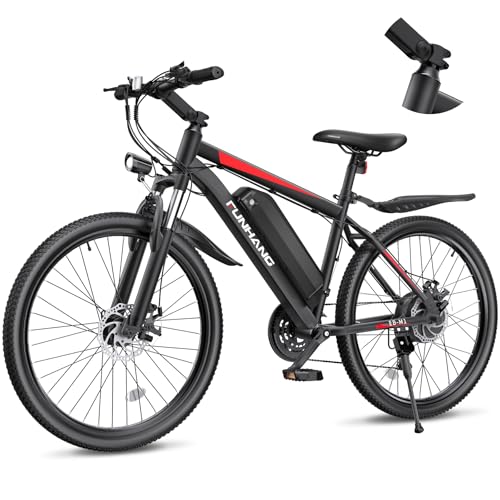
This Funhang brings a 1000W peak hub motor, a 48V 374.4Wh removable battery, and a 21-speed drivetrain with a lockable suspension fork. For the best electric bike for commuting on bike lanes, the power is more than enough for hills and headwinds. The listed 21.7 mph top speed and up to 50 miles range are achievable under gentle assist on flatter routes. In real commutes, expect 18–35 miles depending on rider weight, terrain, weather, and assist level. The adjustable stem and fenders add real comfort and cleanliness for daily rides.
What I like most is the balance of control and cushion. The front suspension and 26-inch wheels smooth out expansion joints and rough paint lines without feeling sluggish. With 21 speeds, you can keep a steady cadence in mixed traffic. If your city enforces Class 1/2 rules on shared paths, keep the assist capped. Check your local regulations before riding. For many riders, this setup makes the best electric bike for commuting on bike lanes when you want just a bit more muscle for hills.
Pros
- Strong hill support with 1000W peak motor
- Lockable fork improves comfort and control
- Fenders help keep clothes clean on wet roads
- Adjustable stem dials in fit for long rides
- 21-speed drivetrain manages varied terrain
Cons
- 374Wh battery may limit long-range high-assist rides
- More gears mean more tuning over time
- Heavier than minimalist commuter bikes
- Top speed still requires local law awareness
- Basic lights may need upgrading for night use
My Recommendation
If you climb hills or face strong winds, this is a great pick for the best electric bike for commuting on bike lanes. It adds comfort and power without blowing the budget. Keep assist modes sensible to maximize range and stay lane-friendly.
| Best for | Why |
|---|---|
| Hilly commutes | 1000W peak motor handles climbs and headwinds |
| Comfort seekers | Lockable fork and adjustable stem improve ergonomics |
| Wet climates | Full fenders reduce road spray on clothes |
Ridstar 1000/2000W, 20″ Fat Tire, 25–37 mph Options
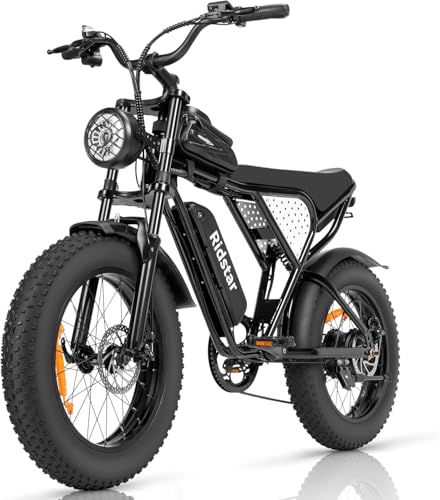
The Ridstar looks like a compact electric motorcycle with 20-inch fat tires, big battery options (up to 40Ah noted), and claimed speeds ranging from 25 to 37 mph, depending on configuration. It’s powerful and designed for mixed terrain with a rugged build. For the best electric bike for commuting on bike lanes, I see this more for road use, delivery routes, or street bike lanes where Class 3 or moped-style rules may apply. Many shared-use paths restrict higher-speed e-bikes, so check local regulations very carefully before riding.
That said, fat tires grip well on rough city patches, tracks, and light gravel. The Shimano 7-speed helps get you moving from a stop. With the larger battery options, range can be very strong if you moderate speed. The downside is weight and size. It’s not as nimble in tight bike-lane traffic, and storage can be tricky. If your commute is mostly on-street lanes and you want a moped-like feel, this can work, but ride responsibly and stay within posted speed rules.
Pros
- Very strong power for street commutes
- Fat tires add grip and stability on rough surfaces
- Large battery options can deliver long range
- Solid frame feels planted at speed
- Good for delivery riders needing torque
Cons
- Likely not allowed on many shared-use paths
- Heavier and bulkier in tight bike lanes
- Higher speeds require extra caution and legal checks
- Storage and carrying up stairs are tough
- May need better lights and mirrors for street riding
My Recommendation
I’d choose this only if your commute is mainly on-street bike lanes and you need power. It’s not my first choice for the best electric bike for commuting on bike lanes where shared paths are common. Know your laws and keep speeds aligned with posted limits.
| Best for | Why |
|---|---|
| On-street lanes | Power and stability suit street speeds |
| Delivery work | Torque and big battery options support long shifts |
| Rough pavement | Fat tires smooth cracks and potholes |
Funhang 26″ 1000W Peak City Cruiser, 21.7 mph
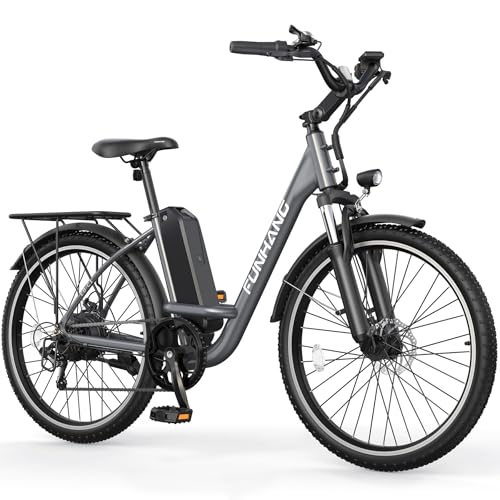
This Funhang city cruiser adds commuter essentials: rear rack, fenders, adjustable stem, and a comfortable upright fit. The 48V 374.4Wh removable battery and 1000W peak motor give you smooth launches, while the 7-speed drivetrain keeps shifts simple. If you want the best electric bike for commuting on bike lanes with daily utility, this checks many boxes. Expect a realistic 18–35 miles per charge in mixed urban riding when you manage assist and speed.
The rear rack is key for panniers or a work bag. Fenders keep you dry. The 21.7 mph top speed is quick for city traffic, but I suggest using lower assist on shared-use paths to align with common Class 1/2 expectations. Handling is steady on 26-inch tires, and the cockpit tweaks make long rides friendlier on the wrists and back. It’s an easy transition bike if you’re coming from a regular city hybrid and want power without complexity.
Pros
- Rear rack ready for bags and cargo
- Fenders protect in rain and slush
- Adjustable stem improves comfort and posture
- Simple 7-speed drivetrain reduces fuss
- Good power for quick starts and mild hills
Cons
- 374Wh battery limits long high-assist rides
- No built-in high-lumen lights listed
- Heavier than a non-assisted city bike
- May need extra lock for city parking
- Brakes and gears need routine tuning
My Recommendation
For everyday errands and reliable commuting, this is one of my top picks for the best electric bike for commuting on bike lanes. It’s practical, comfortable, and easy to outfit for workdays.
| Best for | Why |
|---|---|
| Daily commuters | Rack and fenders handle real-world needs |
| Comfort-first riders | Adjustable stem and upright geometry |
| Simple shifting | 7-speed for low-maintenance riding |
Misodo 500W Folding Ebike, 14″, 20 mph, 25 miles
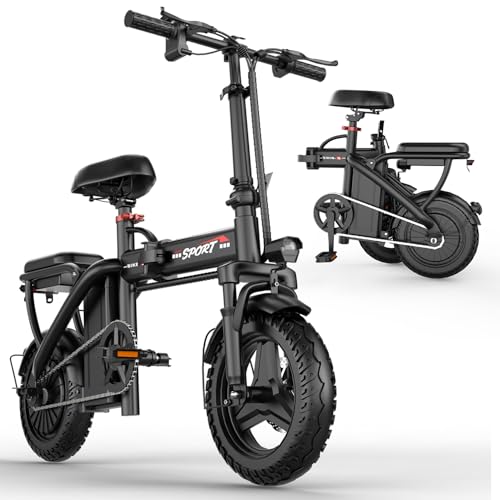
The Misodo folding e-bike is a compact solution for city riders with small apartments or multi-modal commutes. With a 500W motor, 20 mph top speed, and a removable 48V battery, it’s quick to store and carry. The 14-inch wheels make it nimble in tight paths and easy to bring inside. For the best electric bike for commuting on bike lanes where space is limited, this is a clever option. Expect up to 25 miles under light assist and flat terrain; in real mixed riding, many will see 12–20 miles.
Small wheels feel different. They accelerate quickly but can be twitchy on very rough patches. Keep your tire pressure dialed in and ride defensively in crowded lanes. The folding frame makes office storage easy and discourages theft. I suggest adding bright lights and a sturdy lock. If your ride is short, flat, and you need a bike you can stash under a desk, this little commuter punches above its size.
Pros
- Ultra-compact folding design for storage
- Easy to carry on stairs or transit
- 20 mph cap fits many bike-lane norms
- Quick acceleration in city gaps
- Removable battery for office charging
Cons
- Shorter real-world range for longer commutes
- Small wheels can feel twitchy on rough roads
- Less stable at higher speeds
- Limited cargo capacity without add-ons
- May need comfort upgrades (saddle, grips)
My Recommendation
Pick this if storage and portability are your top needs. It’s a smart choice for the best electric bike for commuting on bike lanes when your route is short and you must bring the bike indoors daily.
| Best for | Why |
|---|---|
| Small apartments | Folds down to store in tight spaces |
| Transit combos | Carry onto trains or up office stairs |
| Short, flat rides | 20 mph cap and simple power delivery |
eAhora Romeo Pro 2025, 1600W Peak, 200+ Miles
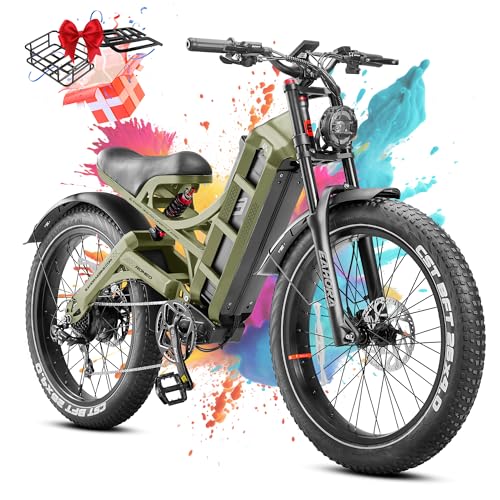
The 2025-upgraded eAhora Romeo Pro is a long-range beast: a claimed 48V 60Ah battery system, fat 26×4.0 tires, and full suspension. The brand touts 200+ miles of range under ideal conditions, which will drop with speed, rider weight, terrain, and assist level. Still, it’s one of the longest-range options you’ll see. For the best electric bike for commuting on bike lanes, this is overkill for short paths but amazing for delivery riders or long suburban routes that stretch across the city.
Full suspension improves comfort on broken pavement and curbs. The peak 1600W power helps on steep hills and heavy loads. Be mindful: higher speeds and weight call for careful braking and lighting. Keep your assist conservative on shared paths and check your local lane rules. If you crave charging once a week and want massive comfort, this model turns daily travel into a smooth, plush ride.
Pros
- Massive battery for very long range
- Full suspension increases comfort and control
- Fat tires grip on rough city surfaces
- Plenty of power for hills and cargo
- Great for delivery and long commutes
Cons
- Heavy and bulky for small apartments
- Likely too powerful for some shared paths
- Higher price than basic commuters
- May need upgraded brakes for heavy loads
- Transport on car racks can be tricky
My Recommendation
If you ride far and hate charging, this could be your best electric bike for commuting on bike lanes that are mainly on-street. It shines for long distances, deliveries, and rough roads, as long as you respect speed rules and local regulations.
| Best for | Why |
|---|---|
| Ultra-long commutes | Huge battery reduces charging stops |
| Delivery riders | Power and range for full-day routes |
| Rough pavement | Full suspension and fat tires boost comfort |
“I Brake for Bike Lanes” Insulated Tumbler
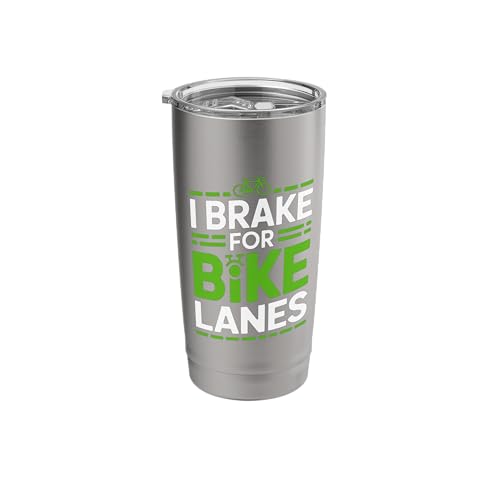
This stainless steel insulated tumbler is a small but useful add-on for daily riders. It keeps coffee hot and water cold, which matters on early rides and hot afternoons. I like it because it fits the bike-lane theme and reminds drivers that cyclists share the road too. For the best electric bike for commuting on bike lanes, a good tumbler pairs with a rack or bottle cage so you stay hydrated and focused.
Insulation helps in all seasons. I suggest using a leak-resistant lid and a cup holder or secure pannier pocket. Don’t drink while moving in crowded lanes. Take safe stops. A simple item like this makes commuting more pleasant and keeps you from buying wasteful single-use cups every day.
Pros
- Keeps drinks hot or cold for hours
- Durable stainless steel build
- Fun bike-lane message for awareness
- Good size for workday hydration
- Reduces single-use cup waste
Cons
- Must secure it to avoid spills
- May not fit all bottle cages
- Hand-wash often recommended
- Not a safety device; purely convenience
- Adds slight weight in your bag
My Recommendation
If you ride daily, this is a nice comfort upgrade at a low cost. It pairs well with any pick for the best electric bike for commuting on bike lanes, especially if your route is hot or cold.
| Best for | Why |
|---|---|
| Daily coffee drinkers | Keeps drinks at the right temperature |
| Eco-conscious riders | Reusable, cuts single-use waste |
| Long rides | Stay hydrated without frequent stops |
FAQs Of best electric bike for commuting on bike lanes
What e-bike class is best for bike lanes?
Class 1 and Class 2 (up to 20 mph) are widely accepted on many bike lanes. Always check local rules.
How much range do I need for commuting?
Add 30–40% buffer. A 20-mile round trip often needs a 375–500Wh battery with moderate assist.
Are fat tires good for city bike lanes?
Yes for comfort and grip on rough pavement. They add weight, so plan for slower acceleration.
Do I need fenders and a rack?
For daily commuting, yes. Fenders keep you clean, and a rack carries bags safely.
Is 22–28 mph legal on shared paths?
Often no. Shared-use paths usually align with Class 1/2 speeds. Verify local regulations.
Final Verdict: Which Should You Buy?
For most riders, the Funhang 26″ City Cruiser offers the best mix of comfort, utility, and value for the best electric bike for commuting on bike lanes. Choose the Misodo if storage rules your life. Go eAhora Romeo Pro for ultra-long routes and delivery work. Always match power and speed to your local path and bike-lane rules.




Leave a Reply